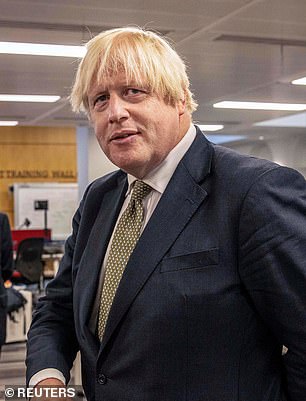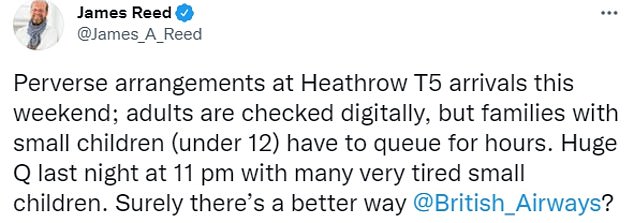Furious travel firms today suggested ministers had little interest in sorting out nightmare queues at Heathrow because they wanted to ‘put people off flying overseas’ – as others complained the chaotic scenes were damaging Britain’s image.
Elderly people and exhausted families with young children could be seen sitting on the floor in the queues at Terminals 2 and 5 on Sunday, with travellers waiting as long as five hours.
Similar scenes have been repeated numerous times this summer, with the government blaming the issue on a lack of Border Force staff.
Noel Josephides, Director of AITO, the Specialist Travel Association, suggested there were broader considerations at play, telling MailOnline: ‘Very unfortunately, we believe that allowing such unnecessarily bad experiences to occur is part of the Government’s strategy simply to put people off travelling overseas.’

Parents complained on Sunday about being corralled to the limited number of counters operated by Border Force staff because facial recognition on e-gates does not work with babies and toddlers
Clive Wratten CEO of the Business Travel Association (BTA), described the scenes as ‘very worrying’.
He said: ‘As the world continues to open up safely, it is essential that there is enough staff and support at all points of a journey.
‘The travel experience needs to be as frictionless and consistent as possible to give all travellers the confidence they need to return in large numbers.’
Jacqueline Dobson, President of Barrhead Travel, which describes itself as the UK’s leading independent British travel agents, said: ‘From a visitor perspective, arriving into Heathrow is the first impression many will get of the UK – and first impressions matter.’
Heathrow’s summer of queuing chaos: So when WILL the government get a grip?
May 17 – Passengers flying into the UK faced ‘bedlam’ at the border with some facing a three hour wait at the Heathrow passport gates. Travellers told MailOnline how they were ‘terrified of catching Covid’ while being crammed into the airport’s border hall this morning.
July 12 – Passengers said they had ‘never seen anything like’ the queues at Heathrow Terminal 5 as officials blamed the scenes on staff having to self-isolate. A passenger said: ‘Total chaos at security at Heathrow airport T5 this morning. Never seen anything like it.’
July 20 – 90-minute queues were seen at arrivals after the government failed to update Passenger Locator Forms ahead of its ‘Freedom Day’ rule changes – resulting in double-jabbed Britons being rejected at e-gates.
August 2 – Queues of passengers stretched the entire length of Terminal 5. Officials again blamed staff having to self-isolate. A spokesman quoted figures showing that one in four Border Force guards were reported to be off sick with Covid or self-isolating.
August 29 – Three-hour waits were reported at passport control. A day later the Home Office risked fury as it said passengers ‘need to accept’ the risk of delays at peak times.
Advertisement
The Home Office has risked fury after it said travellers ‘need to accept’ they could face lengthy delays during peak travel times due to the need to process people’s Covid documents.
But today a senior Tory MP insisted the issues should have been addressed ‘a long time ago’.
‘This has been a constant problem throughout the pandemic and I appreciate the Home Office may have had difficulties recruiting to the Border Force but that is not a new problem,’ the MP told MailOnline.
‘They should have addressed this a long time ago. It adds to travel uncertainty and it is not good for the travel industry or the travelling public. The Border Force needs to be better organised.’
Mark Fuller, CEO of Sanctum Hotel Group, which runs a string of luxury hotels including the Karma Sanctum Soho, said the queues would put off future visitors to the UK.
‘It’s worrying enough for visitors to come into the UK with the high levels of Covid, but if it’s going to take them four hours to get through arrivals that’s not going to help,’ he said.
‘Particularly if it continues to be like that, people are going to think, why bother? That will lead to more debt, more empty hotels and restaurants. We need the tourism industry back and the government to help us.’
Karen Dee, CEO of the Airport Operators Association, argued that only more Border Force staff would solve the problem.
‘Important steps have been taken to digitise Covid-19 checks, and combined with the checks airlines undertake, these ensure public health is safeguarded while allowing border processing to be quicker and simpler,’ she said.
‘However, a smooth border experience still requires Border Force to fully staff the border halls at peak times, such as a bank holiday weekend.
‘With many other pressures on the UK border, Border Force need to ensure they have the full staff complement necessary to fulfil all their duties, both at airports and elsewhere.’

Hundreds of holidaymakers were seen standing in close proximity to each other as they waited pass through checks at Border Control yesterday
AITO director Noel Josephides said Sunday’s issues had been exacerbated by a combination of peak numbers of returning tourists and the need to manage evacuees from Afghanistan, both issues he said ‘could have been mitigated’.
He also noted the issue of facial recognition systems on e-gates not working with children under-12.
‘The lack of a facility for families to use E-gates meant that those with children were forced to queue twice and to be hand checked,’ he said.
‘This is down to a lack of automation of the considerable amount of paperwork currently involved in travelling overseas, and this could and should have been resolved long since.’
Criticising ministers, he added: ‘They have given no sector-specific support whatsoever to tour operators and travel agents such as AITO members, despite the billions of pounds that we have previously paid, annually, into the Government’s coffers.
‘They have, however, supported aviation to the tune of £7billion during the pandemic, while ignoring the plight of operators and agents.’
Steve Witt, co-founder of Not Just Travel said: ‘We want to always ensure our customers have a great experience and we’d hate to think that their lasting memory of their holiday was being in a queue for 4 hours when they got home. Of course we fully appreciate the logistical issues being faced by Heathrow, but the customer experience is our top priority.’


Under fire: Prime Minister Boris Johnson and Grant Shapps, the Transport Secretary
On Sunday, parents complained about being corralled to the limited number of counters operated by Border Force staff because facial recognition technology on e-gates does not work with babies and toddlers.
Disgruntled passengers took to social media to share their frustration, with one claiming ‘only 5-6 counters out of 32 were operational’.
Entrepreneur James Reed tweeted: ‘Perverse arrangements at Heathrow T5 arrivals this weekend; adults are checked digitally, but families with small children (under 12) have to queue for hours. Huge Q last night at 11 pm with many very tired small children. Surely there’s a better way.’
And Camilla Kerr added: ‘Yesterday I arrived at London Heathrow to chaotic queues. Families with kids can’t go through the e-passport checks so we had to queue for the border guards. Problem is there was only two employed to deal with hundreds of families. Why wouldn’t you employ extra guards?’


Entrepreneur James Reed and traveller Camilla Ker were among those stuck in the nightmare queues this weekend
But the Home Office said its ‘utmost priority is protecting the safety and health of the public’.
A spokesman said: ‘Our utmost priority is protecting the safety and health of the public and we will never compromise on security, and on ensuring passengers are compliant with the current health measures, which means passengers will need to accept an increase in the time taken to cross the border.
‘The rollout of upgrades to our eGates to automate checks for health requirements is ongoing, with many eGates already in operation and more to be added over the coming months to increase automated checks on passengers at airports.
‘However, for safeguarding reasons, families with children under the age of 12 are not permitted to use the eGates. Where there are high volumes of families with young children, such as over the summer holidays, Border Force may dynamically deploy resources to frontline desks instead and we continue to flexibly deploy our staff to make the process as smooth as possible.’
Last month, Border Force officers were reportedly told they no longer needed to make Covid checks on all arrivals in a bid to reduce airport queues.
Officials were told they no longer have to ‘routinely’ check passengers arriving from green and amber list countries, according to a leaked report obtained by the Guardian.
Arrivals currently have to provide a negative Covid test taken before departure and must complete a Passenger Locator Form within 48 hours of departure to the UK.
What do arrivals from green and amber list countries need to do before they travel?
Green List
– You must take a Covid test before you travel. This can be a PCR, Lamp or anti-gen but must meet specific requirements – of ≥97% specificity, ≥80% sensitivity at viral loads above 100,000 copies/ml.
– You must book and pay for a ‘Day 2’ Covid test to be taken two days after your arrival in the UK.
– You must fill out a Passenger Locator Form within 48 hours of travel
Amber List
All of the above. PLUS:
– If you are NOT double vaccinated you must quarantine at home for at least 10 days. You can be released earlier if you take part in the Test and Release scheme.
– If you ARE double vaccinated you will need to declare that you have been fully UK vaccinated on your passenger locator form or you are under 18 and resident in the UK. You will need to show proof of your vaccination status to your carrier (ferry, airline or train) when you travel.
Advertisement
Source link : https://www.dailymail.co.uk/news/article-9943259/Furious-travel-firms-say-nightmare-Heathrow-queues-government-strategy.html












